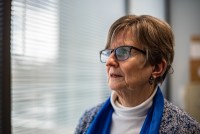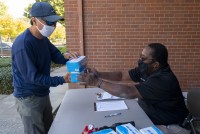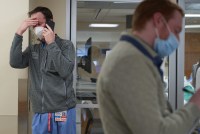Latest California Healthline Stories
Pandemic Medical Innovations Leave Behind People With Disabilities
As the country enters Year 3 of the pandemic emergency, people with disabilities across the U.S. are still finding it difficult to use innovations in telemedicine, teleworking, and testing.
More Black Americans Are Buying Guns. Is It Driving Up Black Suicide Rates?
Gun buying among African Americans has soared in recent years. So have suicide rates among young Black men. Suicide prevention and gun safety efforts need to address race and cultural differences, Black gun owners say.
KHN’s ‘What the Health?’: Congress Shelves Covid Funding for Now
The Biden administration’s request for billions more in funding to fight covid-19 hit a snag on Capitol Hill this week, as Democrats objected to Republican demands that money allocated to states but not yet spent be reclaimed. Meanwhile, the big annual spending bill about to cross the finish line addresses other health policy changes, such as giving the FDA authority to regulate “synthetic” nicotine. Joanne Kenen of the Johns Hopkins Bloomberg School of Public Health and Politico, Rachel Cohrs of Stat, and Jessie Hellmann of Modern Healthcare join KHN’s Julie Rovner to discuss these issues and more. Plus, for extra credit, the panelists recommend their favorite health policy stories of the week they think you should read, too.
Which Companies Aren’t Exiting Russia? Big Pharma
U.S. and global drug manufacturers invested in Russia’s sizable pharmaceutical industry contend international humanitarian law requires they continue manufacturing and selling their products there, even while condemning the Ukraine invasion. Not everyone agrees.
The CDC’s New Guidelines on Covid Risk and Masking Send Confounding Signals
The agency’s updated recommendations lower the level of covid risk for most of the country and therefore the need to mask. But some experts question the strategy.
The NFL Has Been Using an Unproven Measure to Get Players With Covid Back on the Field Fast
Doctors and scientists are debating whether a little-known measure in covid testing should be used to distinguish who is infectious from who isn’t. The NFL adopted the practice, but laboratory professionals caution against its use.
One California University Has Unified Town and Gown to Fight Covid. Why Haven’t Others?
The University of California-Davis has spent close to $50 million preventing the spread of covid on campus — and among residents and workers in the adjacent city of Davis. By most accounts, this town-gown experiment has paid off nicely.
Watch: California’s Top Health Adviser on Learning to Live With Covid
KHN Senior Correspondent Samantha Young joined California Health and Human Services Secretary Mark Ghaly for an engaging conversation about how California moves forward in an environment in which covid persists, but at more manageable levels.
Charts Paint a Grim Picture 2 Years Into the Coronavirus Pandemic
The on-off nature of the pandemic “has led to a lot of the confusion and grumpiness,” says one expert. Another compares it to the exhaustion of the American public when hearing body counts during the Vietnam War.
Patients Divided Over Alzheimer’s Drug: Is It a ‘Risk I’m Willing to Take’ or Just a ‘Magic Pill’?
Medicare has proposed limiting coverage of Aduhelm, the costly new drug to treat Alzheimer’s disease, and several prominent groups representing patients and their families are pressing the program to make it more widely available. But among individuals facing the disease, the outlook is more nuanced.














